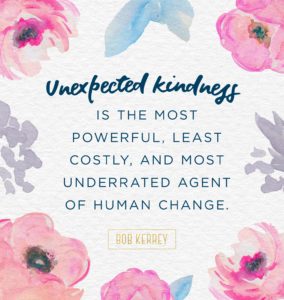

In her latest blog, Gemma writes about her experience in schools and the culture of kindness.
Kindness is something that we often take for granted and it’s power underestimated, especially in the school environment.

I’ve been thinking about writing a new blog for a while, but was unsure what to publish. So much has been going on recently including showcasing at a number of conferences and exhibitions, collaborating with like minded people to hold and Expo for small businesses where wellbeing in schools is at the heart of what they do, podcasts, networking, launching our community project #FarnworthMatters, as well as the usual day to day stuff that Liz and I love so much with schools. (God, I feel exhausted just looking at the list!)
However, this week, a 17 year student, who attended the same school as my daughter, took her own life by jumping from the motorway bridge, yards away from the school grounds. The news has shook the local community, the students and staff of the school as well as myself, as a parent.
It got me thinking about how the pressures our children are under, are so intense, they feel so isolated and alone, that these tragic events occur. This has got to change and the only way to make changes is if we start changing as people, as a culture, as a community. Giving the support and time to students like this young girl, showing that we care, by listening, by understanding, by being kind.
We’ve had the pleasure of working in a number of amazing schools recently in our Mindset Motivation sessions and we pride ourselves on a bespoke package, where the needs of the class are looked at and carefully planned for. More and more classes, that I’m coming across lack in empathy towards their peers and quite honestly can be cruel to one another, mocking and ridiculing in order to make themselves feel better or noticed. The impact that this has, even at primary school level, will have enormous consequences on the mental health of our children as they continue to grow.
So, I want to share some tips, allowing teaching staff to make this a priority in their classrooms and prevent these unimaginable incidents from happening in the future.
1) Talk about what makes a great friend: I often get children to generate a list of adjectives and the common word is always ‘kind.’ We talk about how it’s easy to be kind to people we are friendly with, but takes so much more effort to be kind to people we don’t really know, who have differences or who may even be unkind to us.
2) Think about why people are unkind: Typical reasons that are discussed could be
Sometimes its to make them feel better
Sometimes its because they think they are superior
Sometimes they feel threatened by others
Sometimes its because they are sad
As we try and encourage children become more growth orientated, we recognize that these reasons are of a fixed mindset and people have a choice to change.
3) Explain why kindness is the right thing to show: This is not just a personality trait, this is science. Not only does kindness benefit the person who is receiving it, but also the person who is giving it. Our brain produces amazing ‘feel good chemicals,’ which ultimately impact on our mental wellbeing.
*Serotonin: increases happiness and helps with appetite, sleep, and memory.
*Endorphins: trigger positive feelings and are natural painkillers.
*Oxytocin: reduces blood pressure and protects the heart. It produces a feeling of love and satisfaction.
I’ve also paired the names of these chemicals up with actions, so the children can remember them (Always seem to get ‘endolphins,’ rather the ‘endorphins’ for some reason!)
4) Practice saying kind words to each other: Sometimes children don’t know what to say, so I make cards with suggested quotes. Things to make each other laugh and smile. This is about building bonds with each other and as many people as possible. Examples such as, “You’re better than unicorns because you’re real, Without you our class would be incomplete, You are a cupcake in a world full of muffins.”
We have a great time wandering around the class exchanging these sayings, but the more we say them, the more they become a natural part of what we do. After a few weeks in one particular school, the children were sharing comments with me on my last session with them, “Gemma, you deserve a sheet full of gold stars, Gemma, you’ve made a real impact on my life, Gemma, you have given me a super power.” Our chemicals were going crazy!
5) Team work: If you build a class culture where everyone is on the same side, working together, rather than fighting for their place in society, what an amazing education system we would have. Get your children working together more. Quite often, I go into schools, children are in rows, children work independently because, “They can’t work together.”
Well, unless we tackle this issue head on, making time for it, the problem will never go away. When you start team work, make it non-academic, something everyone can access. I used a wordsearch with synonyms for ‘kindness’ in. They took turns to find the words in the wordsearch and their partner had to use words of kindness (again, given to them) throughout the activity, without being able to tell each other the answers. Things like, “Well spotted, Great going, You’re so close, You’re a wordsearch wizard.” Again, the buzz was fabulous, smiles, laughter, encouragement, not a cruel word in sight.
6) Role model kindness: It’s so easy sometimes to say things to a child, without realizing the lasting impact those words can have. It’s a process of Stop, Think, Say. The better your relationship with your children, the more likely they will turn to you if they are struggling. Not only should we do this with the children we teach, but with our colleagues, our friends, the people we meet. Messages always seem to filter back to the children about our integrity and persona.
Since developing my own knowledge of mindsets, I’ve made a real shift in terms of my empathy towards others, I’ve been more kind and do you know what? It feels bloody good!
Now don’t get me wrong, being kind is not going to solve the countries ever growing mental health problem but as I always say to the children, if we want a nicer world, where everyone supports each other without judgement. Where everyone feels safe and loved. Where everyone has someone to turn too, when they’re feeling low, then it has to start with us. It often takes a tragic event to evaluate and take stock of what is really important. The bigger picture and the future of our children is paramount, not SATs, not GCSE’s, not targets, not predicted grades and how many Pupil Premium children are making progress (or not).
Lets make a change, let’s be that pebble in the ocean and watch the ripples flow.
You must be logged in to post a comment.
A practical pleasure to read, thank you for sharing.
I think the most endearing trait for my two little girls were facilitating and role modelling what it takes to work with someone to generate kindness.
One is now a Lawyer and the other studying Physiotherapy.
The image & words are beautiful.